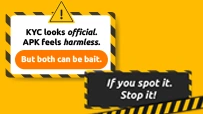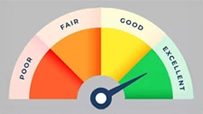A Comprehensive Guide to Recurring Deposit Account Closure Procedures
Disclaimer: The information mentioned herein is generic in nature. Please contact Ujjivan SFB for RD service-related queries.
September 03, 2025

Closing a recurring deposit account can be a complex process, but it doesn't have to be. Whether you need to withdraw funds for an emergency or want to close the account entirely, understanding the procedures involved is crucial. In this comprehensive guide, we will break down the steps for recurring deposit account closure procedures and explain withdrawal procedures as well. By the end, you'll have all the knowledge you need to confidently handle account closure and withdrawals.
Recurring Deposit Account Closure - Offline
Before proceeding with the closure of your recurring deposit account, it's essential to understand the procedures involved. Follow these steps, when closing your recurring deposit.
- Contact the Bank: Reach out to your bank's customer service or visit your nearest branch and inform them about your intention to close the recurring deposit account.
- Provide Necessary Documents: The bank will ask for certain documents for verification purposes. These may include your original identity proof, address proof, PAN card, and passbook or statement of the recurring deposit account.
- Fill Out Closure Form: Complete the necessary closure form provided by the bank. This form will require details such as your name, account number, reason for closure, and signature.
- Settle Outstanding Dues: If you have any outstanding dues or penalties, ensure that you clear them before proceeding with the closure. This step is important if you have a loan against recurring deposits.
- Return Passbook: Hand over your passbook and to the bank. Make sure to retrieve any personal documents or items you may have provided as security.
- Complete the Closure Process: Once you have completed all the necessary steps, the bank will process your request and close the recurring deposit account.
Recurring Deposit Account Closure – Online via Mobile Banking
You can close your RD in seconds with Ujjivan’s Mobile Banking app.
Step 1: Log in to your account using 4-digit MPIN code
Step 2: Swipe Left and tap on ‘Deposits’
Step 3: Tap on ‘RD Closure’
Step 4: Check all the details including interest pay-out and click ‘Confirm’
The applicable amount along with interest would be credited to your linked bank account
Withdrawal Procedures for Recurring Deposit Accounts before Maturity
In certain situations, you may need to withdraw funds from your recurring deposit account before its maturity period ends. Here's what you need to know about RD withdrawal procedures:
Premature Closure
If you need to close your recurring deposit account before its maturity date, you can do so by opting for a premature closure. However, keep in mind that premature closure usually comes with certain penalties or charges, as per the bank's terms and conditions.
Tax on Interest Earned
It's essential to understand that the interest earned on your recurring deposit account is subject to taxation. Make sure to declare this income in your tax returns and pay any applicable taxes accordingly.
Plan Your Withdrawal Strategically
Before withdrawing funds from your recurring deposit account, consider your financial goals and evaluate if it is the best option for you at that particular time. Speak with a financial advisor if needed to make an informed decision.
A Few Examples
To better understand recurring deposit account closure procedures and withdrawal processes, let's explore a few practical scenarios:
Scenario 1: Emergency Funds
Suppose you have a recurring deposit account, and an unexpected medical emergency arises. You need a substantial amount of money to cover the expenses. In this case, you may opt for a premature closure by following the recurring deposit account closure procedures listed above.
Scenario 2: Early Financial Goal
Imagine you've been diligently saving for a down payment on a house through your recurring deposit account. However, you recently found a home at an attractive price. In this scenario, you can partially withdraw funds from your recurring deposit account to cover the down payment while keeping the remaining amount invested.
Scenario 3: Better Investment Opportunity
Suppose you come across an attractive investment opportunity and want to utilise the funds in your recurring deposit account for it. In this situation, you can choose premature closure of your recurring deposit account to seize the investment opportunity.
Final Thoughts
Closing a recurring deposit account or making withdrawals doesn't have to be intimidating or confusing. By following the recurring deposit account closure procedures outlined in this comprehensive guide, you can confidently navigate through these processes. It's important to keep in mind your financial goals and evaluate the best course of action for each situation.
Start small, dream big! Invest in Ujjivan Small Finance Bank’s Recurring Deposit and enjoy higher interest rates! Save for your long- and short-term goals with our RD and live a stress-free financial life. Start investing with just ₹100!
Disclaimer:
The contents herein are only for informational purposes and generic in nature. The content does not amount to an offer, invitation or solicitation of any kind to buy or sell, and are not intended to create any legal rights or obligations. This information is subject to updation, completion, amendment and verification without notice. The contents herein are also subject to other product-specific terms and conditions, as well as any applicable third-party terms and conditions, for which Ujjivan Small Finance Bank assumes no responsibility or liability.
Nothing contained herein is intended to constitute financial, investment, legal, tax, or any other professional advice or opinion. Please obtain professional advice before making investment or any other decisions. Any investment decisions that may be made by the you shall be at your own sole discretion, independent analysis and evaluation of the risks involved. The use of any information set out in this document is entirely at the user’s own risk. Ujjivan Small Finance Bank Limited makes no representation or warranty, express or implied, as to the accuracy and completeness for any information herein. The Bank disclaims any and all liability for any loss or damage (direct, indirect, consequential, or otherwise) incurred by you due to use of or due to investment, product application decisions made by you on the basis of the contents herein. While the information is prepared in good faith from sources deemed reliable (including public sources), the Bank disclaims any liability with respect to accuracy of information or any error or omission or any loss or damage incurred by anyone in reliance on the contents herein, in any manner whatsoever.
To know more about Ujjivan Small Finance Bank Products Visit:"https://www.ujjivansfb.in"
All intellectual property rights, including copyrights, trademarks, and other proprietary rights, pertaining to the content and materials displayed herein, belong
to Ujjivan Small Finance Bank Limited or its licensors. Unauthorised use or misuse of any intellectual property, or other content displayed herein is strictly prohibited and the same is not intended for distribution to, or use by, any person in any jurisdiction where such distribution or use would (by reason of that person’s nationality, residence or otherwise) be contrary to law or registration or would subject Ujjivan Small Finance Bank Limited or its affiliates to any licensing or registration requirements.
FAQs
1. Can I close my recurring deposit account online?
The availability of online closure options varies across banks. It is best to check with your bank to determine if they offer online closure facilities for recurring deposit accounts.
2. Are there any charges for closing a recurring deposit account prematurely?
Yes, premature closure of a recurring deposit account usually incurs charges or penalties, as per the terms and conditions set by the bank.
3. Can I withdraw funds from my recurring deposit account before its maturity date?
Yes, some banks allow partial withdrawals from recurring deposit accounts after a specific period.
4. How is the interest earned on a recurring deposit account taxed?
The interest earned on a recurring deposit account is subject to taxation. It is important to declare this income in your tax returns and pay any applicable taxes accordingly.
5. Can I change my decision to close a recurring deposit account once I have initiated the closure process?
Depending on the bank's policies, you may be able to withdraw your closure request within a certain period after initiating the process.
6. How long does it take to close a recurring deposit account?
The time taken to close a recurring deposit account may vary depending on the bank's procedures. It typically takes a few business days for the closure process to be completed.
7. Are withdrawal procedures the same across all banks?
Generally speaking, most banks follow the same withdrawal procedures. However, do check with your bank for further details.
8. Can I close my recurring deposit account at any branch of the bank?
In most cases, you can close your recurring deposit account at any branch of the bank where you hold the account.
9. What happens to the interest earned if I close my recurring deposit account prematurely?
When you close your recurring deposit account prematurely, the interest earned up until that point will be calculated and paid out as per the bank's policies.
Latest Blogs

APK Fraud: How One Wrong Download Could Empty Your Bank Account
May 13, 2025
Picture this. You’re sipping your evening tea when your phone rings.

Gold Loan LTV Ratio Explained (75% to 85%): What It Means for Borrowers
March 20, 2025
In June 2025, the Reserve Bank of India (RBI) introduced a significant relaxation for gold loan borrowers: the maximum Loan-to-Value (LTV) ratio for loans below ₹2.5 lakh was raised to 85%, up from the long-standing cap of 75%. Loans between ₹2.5 lakh and ₹5 lakh can now go up to 80%, while loans above ₹5 lakh continue under the 75% ceiling.

Good Debt vs Bad Debt: Learn the Difference
August 13, 2025
Every month, millions of Indians wait for the familiar debit alert, an EMI deducted from their account.

Got a Tax Refund? 5 Smart Ways to Put Your 2025 Refund to Work
August 13, 2025
For many taxpayers, there’s a unique sense of relief when a tax refund arrives.

Credit Score Not Improving? 5 Mistakes You Might Be Making
August 13, 2025
For most of us, a credit score feels like a silent judge sitting in the background of our financial lives.





